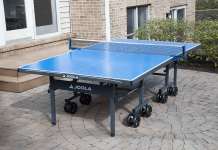Are trivia based games won purely by the luck of the draw? For some, that may seem to be the case. In Wits and Wagers, there are tactics you can use to make yourself more competitive in spite of the random nature of the questions.
While some trivia games allow you to choose your category, Wits and Wagers leaves it completely up to chance when it comes to the bit of information you may be asked to consider. The only sure thing in this game is that the answer will be number based. So that brings to mind the question: What specific strategies are most effective when playing Wits and Wagers?
To answer this question, I’ll first go over the basics of game play to get you up to speed. Next, I’ll walk you through the various strategies and how to implement them to your advantage.
Table of Contents
Game Basics
When considering strategy, it helps to understand the basics of play. If you’re not familiar with Wits and Wagers, it’s a trivia game for 3 or more players ages 6 and up with questions on a wide variety of subjects having answers in a numerical format. It can be played individually or in teams.
Play starts by using your wits. The first question is read aloud. Players have 30 seconds to write an answer on a white board. For example: How many teeth does an adult have, including wisdom teeth? In this case, the answer falls in a fairly small range of possible numbers, even if you don’t know a lot about human biology. Simple and straightforward!
After 30 seconds have expired, answers are then placed on the game board rectangles in numerical order from least to greatest. Placement depends upon the number of players and whether that number is odd or even.
Now for the wagers part of the game. Players have 30 seconds to place two betting tokens each on the board with the answer(s) they believe to be correct. After the first round, players may also have poker chips to bet.
If a player chooses the guess closest to the actual answer without going over, he receives the payout indicated on the board.For example, if wagers on the correct answer in the 3 to 1 payout space, he would multiply his wager times three and receive that many chips in return. If the player guesses incorrectly, he loses all wagered chips, and keeps only his original tokens.
Not complicated, right? And while it’s helpful to have some knowledge or experience with the topics of the questions, it’s a game that can be enjoyed by players of all ages because providing the correct answer is not necessarily the key to winning. The question is, what tricks can help you come out ahead?
Wits and Wagers Strategy
There are several strategies you can use to get a winning edge in Wits and Wagers. Using a combination of these can be the difference between being top dog or at the bottom of the pile.
Know your competition
This is an age-old strategy for most any game. How well do you know the other players? When playing against friends, this is easier to take advantage of. Some things to take into consideration are profession, field of study, and hobbies. Is the player more of a book nerd or pop culture expert? For example, if you’re playing with a paleontologist, he’s going to have an advantage on those dinosaur and other science questions. If your opponent’s a fantasy football fanatic, bet on her knowledge of those sports questions.
When you’re playing with people you don’t know well, don’t despair! The great thing about party games is that they give you the opportunity to get to know new people. Ask a few basic questions, and you’ll have a better idea of what any given player’s knowledge base is. Also, pay attention to the conversations around you to pick up some hints about your fellow competitors just by listening in.
Observe your competitors during play
So you either already know or have learned a bit about the other players. What else can you do to increase your chances of winning? Watch your competitors. This can give some insight into how likely they are to know the answer.
Take notice of their behavior and body language in regards to the following:
How quickly do they answer a given question? Did they write something down immediately or seem to ponder the question?
Are they smiling when the question is read or do they look perplexed? How confident do they appear in the answers they wrote down?
How are your competitors placing their wagers? Are they betting it all on one answer, or splitting their wagers? Watch this part of the game carefully, but remember, you only have 30 seconds to place your wager.
All of these behaviors are valuable tools for evaluating how confident your opponents are in their own answers. Use them to your advantage when deciding where to place your chips and they could help you pull ahead in the game.
Related: Scattergories strategy guide
Bluffing
Whether you’re clueless or you know the correct answer, there’s an opportunity for leading your opponents astray with a false answer or a projection of unwarranted confidence.
You can use a false answer to try and throw your competitors off so that they bid on the incorrect answer. This strategy works best in a situation where you are perceived or known as an expert on the subject of the question. They lose their chips by betting on your expertise, which is a win for you.
Another way to use your bluff to your benefit is to use your false answer to attempt to manipulate the correct answer toward a space with better odds. Do this by writing down an answer you know falls on either side of the correct answer. This could potentially increase your payout.
What if you don’t have a clue as to what the correct answer could be? You can still try to bluff your way to potential victory if you can convince other players that you’re in the know for that particular question. You can do this by appearing confident, writing something down quickly, smiling, or looking smug. They may be convinced to place their wagers on your answer and lose points when the correct answer is revealed.
Diversification
You know the saying about putting all of your eggs in one basket? When you are unsure of the answer, or think that it falls on one definite end of the range, a strategy you can use is to split your bet between two answers. Say you think it’s on the mid to higher end of the range. Bet on the two corresponding answers to increase your odds of being correct.
Calculate Spread
When you have no idea at all about the answer, you could use this quick calculation as a strategy to potentially help you win some chips. The spread is the difference between two consecutive answers on the board.
For example, let’s say the answers on the board are 20, 25, 40 and 50. The option with the highest spread of 15 (calculated by subtracting 25 from 40) would be the answer of 25. This means that this guess has the biggest possible range of potential answers, increasing your odds that the correct answer will fall in that range. Be aware that you’ll need to calculate quickly, as you only have 30 seconds to place your wager.
Wager Amounts
When you’re less confident about your knowledge on a question, you can always wager the minimum to keep from losing points. If you turn out to be correct, you still earn a minimum payout, but if you’re wrong, you don’t really lose anything.
Final Round
It’s time for question 7. What should you do in the last round to try to win it all? It depends on your chip stash size compared to that of the other players.
Are you so many points ahead that it’s unlikely or impossible that someone will catch up on the last question? Place a minimum bet to preserve your winnings.
Are you dead last at this point and really far behind the next closest player? Bet it all to try to pull out a win.
Wrap-Up
Here’s a recap of the basic strategies to consider when playing Wits and Wagers:
- Know your competition – Use your knowledge of the other players when betting on an answer.
- Observe your competitors – Watch other player’s reactions to determine their confidence in their answers.
- Bluffing – Throw your competitors off by providing a false answer.
- Diversification – Split your bet to increase your odds of choosing the correct answer.
- Calculate Spread – Use your math skills to choose the best potential answer if you don’t have a clue.
- Wager Amounts – Decide how much to wager based on your level of confidence in the question subject.
- Final Round – Preserve your lead or go all in to pull out a win.
Do any of these strategies guarantee you’ll be a consistent winner? Maybe not, but you have options to help keep you in the game even if all the questions fall outside of your field of knowledge.

Veronica is a Green Bay-based freelance writer and editor with extensive experience with board games. When not busy scribbling her thoughts, you might find her in her garden, hiking out in the woods, or exploring new food joints.
Veronica is a die-hard board game and chess hobbyist by night. She likes to try out new games and is always on the lookout to recruit new players for her game night (so beware!). When not playing board games or throwing darts, she is usually busy painting miniatures (or doing other nerdy stuff).
She is the CEO & Content Writer of Indoor Games Zone. She shares her expertise from years of playing chess, board games, and darts.

![Stiga XTR Pro Review | 1,559+ Global Ratings (In-Depth Guide) [year] Stiga XTR Pro Review](https://indoorgameszone.com/wp-content/uploads/2021/08/Stiga-XTR-Pro-Review-218x150.jpg)





